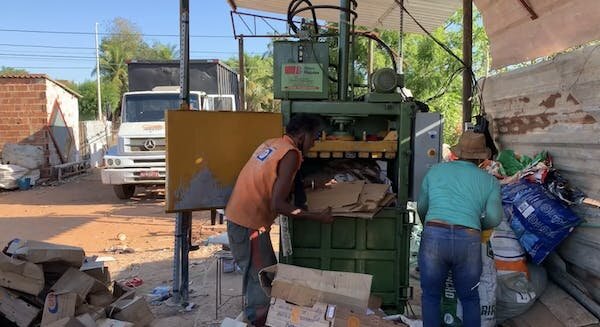Recyclable materials collectors at work in Brazil. Credit: Jannsen Santana, Daiane Scaraboto and Flavia Cardoso
When Luiz Inácio Lula da Silva was sworn in for his third term as president of Brazil on January 1, 2023, he invited a diverse group to accompany him as he ascended the ramp to his offices. Among them, two symbolized the giant step that the country was taking toward a more promising ecological future: Chief Raoni Metuktire, a 90-year-old indigenous leader who dedicated his life to the defense of the Amazon rainforest, and Aline Sousa, a 33-year-old collector of recyclable materials, an occupation pursued by her family for three generations. It was Sousa who placed the presidential sash on Lula, representing not only the Brazilian people but also a message of hope for a more sustainable government for the next four years.
While little noticed, collectors of recyclable materials are omnipresent in Brazil and other developing countries, and their work has long been a critical part of waste management, disposal, and recycling. Working individually, in families or groups, or as part of an association, they pick up materials from households, businesses, and other locations, separate and sell them to recycling firms. Because they increase the amount of materials that can be recycled, collectors are crucial agents in creating a more sustainable world.
Overlooked and undervalued
In part because of the modest nature of materials collection and recycling, there has been comparatively little study on their environmental impact. Our research focuses on waste management during large-scale events attended by millions. In particular, we’re exploring how value is created and destroyed during Catholic pilgrimages in Brazil.
Brazil is an ideal context to study waste management. In 2018, around 79 million tons of solid waste were generated. Just under 60% was collected for transit to controlled landfills, while the remainder went to garbage dumps.
In Brazil, only 4% of what could be recycled actually is, a rate far lower than that of countries with similar income and economic development levels. As a comparison, Chile, Argentina, South Africa, and Turkey have an average of 16% recycling.
According to Brazil’s National Sanitation Information System, in 2020 there were 1,667 duly registered solid waste cooperatives in the country, which were responsible for collecting 35.2% of the solid waste collected. Throughout the country, 35,700 recyclable material collectors are associated in these cooperatives, while as many as 500,000 work informally. Even more impressive is the fact that these workers are responsible for 89% of municipal solid waste returned to industries as raw material.
Despite considerable progress in recent years, most recyclable materials collectors gather and haul tons of paper, glass and plastics across sprawling cities under difficult and unsanitary conditions. Recyclable materials collectors are often low-literate, low-income people of color. Female collectors experience even more vulnerable conditions as, beyond collecting, they play multiple roles (e.g., taking care of their children, older and disabled family members and housework). For many, collecting recyclables is their only source of income.
Even though these workers provide an extremely useful service to society as a whole, they regularly face prejudice and stigma. During interviews, collectors mentioned they are often sworn at or cursed, and they lamented that city residents, businesses, and other institutions neither recognize nor facilitate the vital services they provide. Sentiments of frustration and humiliation are often expressed.
Spokespersons for building environmental awareness
Our ongoing research has also observed the strategic relevance of collectors as key intermediaries connecting homes and businesses that produce waste and recycling facilities. These workers are crucial because they have two primary skills:
- Knowledge: collectors hold a vast array of knowledge on material components, citizens’ disposal practices, and the environment. They acquire this deep knowledge primarily through observation of and discussion with city residents, and also sharing information with other collectors.
-
Reach: often equipped with homemade wheelbarrows, collectors are able to reach households everywhere, including those that are out of reach to motorized vehicles. In so doing, they create a capillary network of routes to recycling materials and then back out to where they’ll be processed.
Many recyclable materials collectors develop bonds with city residents, and so can play an influential role in educating them on the separation and disposal of waste. They can thus help build awareness and be helpful agents during large-scale public events. Their educational work helps residents think more clearly about what they consume and facilitate better disposal practices, leading to a more humanized and efficient recycling process.
This article aims to shed light on one of the most essential and yet marginalized roles in the recycling ecosystem: the recyclable materials collector. These workers can become game changers for societies’ environmental objectives if recognized and valorised. According to Brazilian Association of Public Cleaning and Special Waste Companies (Abrelpe), in 2019, the amount of recyclables that end up in landfills represents a loss of 14 billion Brazilian reals annually (around 2.5 billion euros).
Brazil’s National Solid Waste Plan proposes an increase goal in waste recovery by 50% in 20 years. Some of the materials would be recycled, while others would be composted or used for energy recovery. Consequently, investing resources to improve how collectors are equipped, formalizing their support, and facilitating their vital work in the recycling chain should be at the core of environmental initiatives and public policies.
Provided by The Conversation
This article is republished from The Conversation under a Creative Commons license. Read the original article.
Citation: In Brazil, the future of environmental sustainability needs a strong ally: Collectors of recyclable materials (2023, March 15) retrieved 18 March 2023 from https://phys.org/news/2023-03-brazil-future-environmental-sustainability-strong.html
This document is subject to copyright. Apart from any fair dealing for the purpose of private study or research, no part may be reproduced without the written permission. The content is provided for information purposes only.

